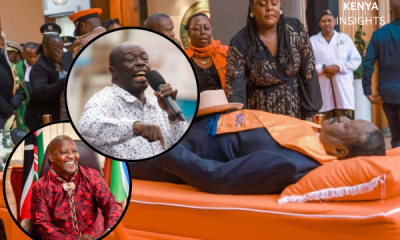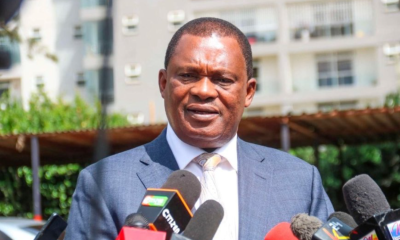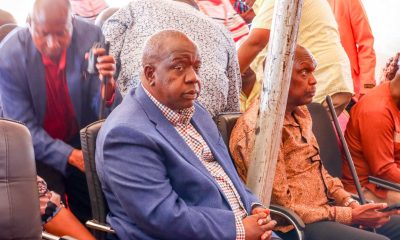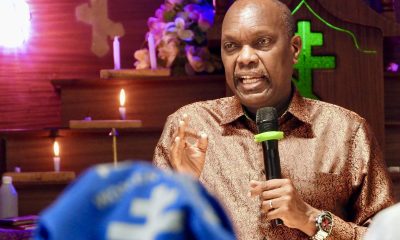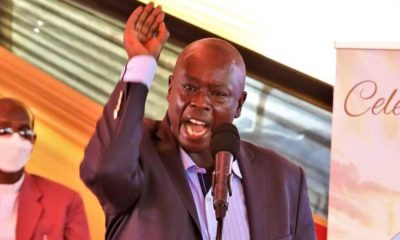Politics
Rigathi, Muturi in Trouble as State Invokes Official Secrets Act to Silence Dissenting Former Officials
Under Sections 3 and 20 of the Official Secrets Act, unauthorized disclosure of government information can lead to imprisonment for up to 14 years without the option of a fine.

The Kenyan government has invoked the Official Secrets Act in what critics describe as a calculated move to silence dissenting former government officials, particularly targeting former Deputy President Rigathi Gachagua and former Public Service Cabinet Secretary Justin Muturi.
Interior Cabinet Secretary Kipchumba Murkomen, appearing before the National Assembly’s Administration and Internal Affairs Committee on Tuesday, issued a stern warning that public officials who disclose classified government information risk prosecution under the Official Secrets Act.
“There are those who are older but do not abide by the Act,” Murkomen stated, adding that “there are attendant consequences to this.”
The CS emphasized that the oath of secrecy taken by public officers prohibits them from disclosing classified information, suggesting that doing so “says something about the person you have entrusted with a public office.”
Under Sections 3 and 20 of the Official Secrets Act, unauthorized disclosure of government information can lead to imprisonment for up to 14 years without the option of a fine.
The law specifically targets individuals who possess or control information entrusted to them in confidence by government officials and subsequently disclose it.
Constitutional Concerns Raised
The move has drawn sharp criticism from legal experts and the targeted former officials themselves.
Former CS Justin Muturi and lawyers David Ochami and Anthony Musau have argued that such application of the Act violates the Constitution.
“All I did was respond to President Ruto, who was my coalition partner within the Kenya Kwanza alliance, because he had exposed me to the public. In any case, I cannot respond to Murkomen because he is not at my level,” Muturi stated in response to the threat.
Legal expert David Ochami noted that contrary to popular belief, the Official Secrets Act does not offer blanket protection to all classified information.
“Despite the Act, past and present officials cannot be penalised for disclosures made in the public interest, especially if the information prevents crimes or wrongdoing by the State,” he explained.
Anthony Musau further criticized the application of the Act as being “at odds with the spirit of a democratic society,” pointing out that “the necessary safeguards to prevent abuse by an overzealous regime are lacking.”
Background of Dissent
The government’s invocation of the Act follows public statements by both Gachagua and Muturi alleging corruption and human rights abuses within the Kenya Kwanza administration.
Muturi previously claimed that the National Intelligence Service (NIS) abducted his son and held him incommunicado, forcing him to seek President William Ruto’s intervention.
He also alleged being coerced by President Ruto into signing a multi-billion shilling tree-planting deal with the Russian government at a foreign airport, and accused the President of using Indian conglomerate Adani to capture operations at Jomo Kenyatta International Airport.
Gachagua, for his part, has publicly accused President Ruto of engaging in questionable business dealings with leaders of Sudan’s Rapid Support Forces (RSF), a militia group blamed for fueling instability in that country.
Constitutional Protections
Legal experts emphasize that freedom of expression is enshrined in Kenya’s Bill of Rights. Article 24 of the Constitution outlines specific conditions under which such rights may be limited, requiring that any limitations must be “reasonable and justifiable in a democratic society.”
Article 33 only allows for curbs on free expression in cases involving incitement to violence, hate speech, or propaganda for war—not to shield government officials or actions from public scrutiny.
Musau summarized the legal contradiction, stating, “The Constitution is the supreme law and binds all persons, including Mr. Murkomen, as well as all State organs at both levels of government.”
As this situation develops, many observers are watching closely to see whether the government will follow through on its threats of prosecution, potentially setting up a significant constitutional test case on the limits of state secrecy versus freedom of expression in Kenya’s democracy.
Kenya Insights allows guest blogging, if you want to be published on Kenya’s most authoritative and accurate blog, have an expose, news TIPS, story angles, human interest stories, drop us an email on [email protected] or via Telegram
-

 Investigations7 days ago
Investigations7 days agoBillions Stolen, Millions Laundered: How Minnesota’s COVID Fraud Exposed Cracks in Somali Remittance Networks
-

 News1 week ago
News1 week agoUS Moves to Seize Luxury Kenya Properties in Sh39 Billion Covid Fraud Scandal
-

 Investigations7 days ago
Investigations7 days agoJulius Mwale Throws Contractor Under the Bus in Court Amid Mounting Pressure From Indebted Partners
-

 News1 week ago
News1 week agoMAINGA CLINGS TO POWER: Kenya Railways Boss Defies Tenure Expiry Amid Corruption Storm and Court Battles
-

 Americas7 days ago
Americas7 days agoUS Govt Audits Cases Of Somali US Citizens For Potential Denaturalization
-

 Americas2 days ago
Americas2 days agoTrump Says US Needs Greenland For Its National Security
-

 Sports2 days ago
Sports2 days agoThe Easy Way to MSport Ghana: From Login to Your First Bet
-

 Sports2 days ago
Sports2 days agoWhat Makes Yesplay the Go-To Gambling Platform for South Africans?



